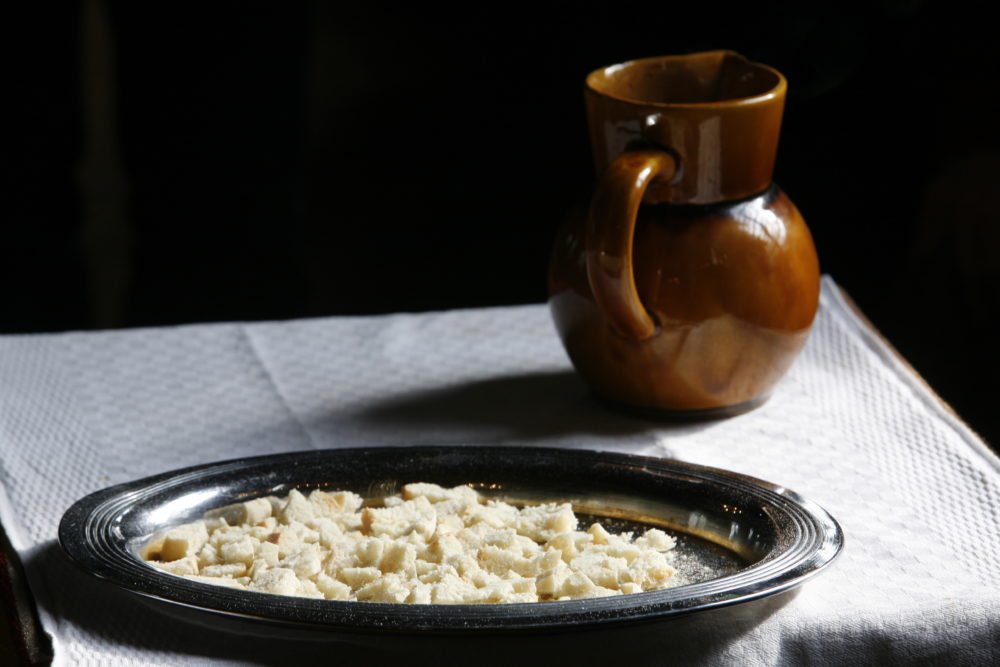The Invitation
Kate Cammell | kac2261@columbia.edu

With her right hand placed over her heart and her left palm opened towards the balcony, Angela Lockett-Colas invited everyone in the church to join in the communion service. The stage lights above her shifted from ice blue to light pink and the eight-member praise band began to play a soft rock melody.
Forefront is an interdenominational church with roots in the Evangelical movement. It’s tucked along a Borem-Hill side street at 509 Atlantic Avenue. During a Sunday morning service, Lockett-Colas, Forefront’s creative director, told the congregation, “Communion is something we do because of the gift we have in Jesus Christ.” As the beat picked up tempo, she reminded the nearly 150 gathered people of the ways that Jesus suffered. “You might feel [persecuted] like that too but you’re loved. You’re loved,” she said.
As Lockett-Colas ushered congregants into the ritual, there was a fullness to her tone that felt assuring, like a mother comforting her children. She beamed as she summoned “anyone” to receive God’s love and to affirm their commitment to Him.
People stood below her on either side of the stage with wooden bowls of bread and large mason jars of red wine, symbolizing the body and blood of Christ. In the Protestant expression of Christianity, communion is a ritual where believers dip bread in wine, and as they eat the mixture they’re asked to reflect on Jesus’ sacrifice.
After Lockett-Cola spoke, members were initially slow to take communion. It was early, so people puttered, like the city buses that had ushered some there that morning. In the last row of the chapel, Georgina Orin followed her friend Grace Dowd into the aisle. Orin’s polka dotted dress sashayed on the wooden floor as she moved in time to the music. Orin, a Californian who once lived in New York, attends Forefront whenever she’s in town.
For Orin, communion is about taking a moment to think about herself in relation to the world around her. Despite the music and the whirl of the lights, there’s a stillness that believers talk about inside themselves. “I think communion is a way to remind you to nourish yourself and that you’re a part of something bigger,” she said.
After reaching the front of the line and dipping the bread in wine, Orin and Dowd made their way back down the aisle. Back at their seats, Orin rested her head on Dowd’s shoulder as they listened to the praise band. People around them raised their hands in the air and bounced on their heels, feeling the music and waiting for everyone to partake in the weekly rite.
Just in case anyone missed Lockett-Colas’s invitation, it was underscored by bold white letters on a large screen at the front of the chapel. “Communion,” the sign announced. Below that it read: “All are welcome at God’s table.” And for Forefront’s members who, like Dowd, identify as queer, seeing “all” written onscreen was key. It’s why many choose to take communion here.
Forefront became an LGBTQ-affirming church in 2014, a controversial move for an Evangelical congregation. The choice was met with loss of both members and funding, but the church stood by its choice. It’s website proudly reads, “We seek community that is inclusive of ALL people.”
Though communion is an individual practice, it’s undertaken—as its name implies—as a community. At Forefront that includes “Conventional Christians and questioning skeptics, Believers and agnostics, Women and men, those of all sexual orientations and gender identities, and Those of all classes and abilities.” It’s a church where juxtapositions are encouraged to rub shoulders.
This is reflected in the communion service as well—old tradition meets new meaning, and, for those who partake of it, a fortification with the warmth of red wine and dance on a chilly February morning in New York City.
